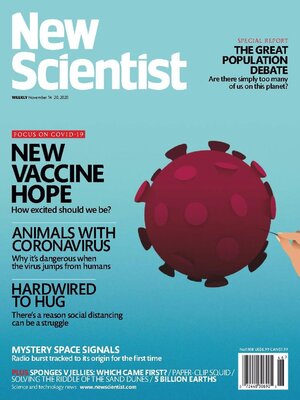New Scientist
magazine ∣ Nov 14 2020 · New Scientist

Sign up to save your library
With an OverDrive account, you can save your favorite libraries for at-a-glance information about availability. Find out more about OverDrive accounts.
Find this title in Libby, the library reading app by OverDrive.



Search for a digital library with this title
Title found at these libraries:
| Library Name | Distance |
|---|---|
| Loading... |
New Scientist covers the latest developments in science and technology that will impact your world. New Scientist employs and commissions the best writers in their fields from all over the world. Our editorial team provide cutting-edge news, award-winning features and reports, written in concise and clear language that puts discoveries and advances in the context of everyday life today and in the future.
Elsewhere on New Scientist
The population question • Those who advocate limiting population must be clear how they intend to do it
New Scientist
A new covid-19 approach • In contrast to his predecessor, US president-elect Joe Biden will use a science-based strategy to tackle the pandemic, says Adam Vaughan
How exciting is the Pfizer vaccine? • The company says its vaccine is 90 per cent effective. What does this really mean and what do we still need to know? Graham Lawton reports
Mink could be just the start • The fact that the coronavirus can spread back and forth between humans and animals is bad news for all involved, reports Graham Lawton
Mammals at risk • Almost 60 species of mammal have so far been found to be susceptible, or probably/possibly susceptible, to SARS-CoV-2, while others probably aren’t at risk. These include:
How humans and bats transmit to each other
European weather services in email storm
The Milky Way could be home to 5 billion planets like Earth
Which animals evolved first? • DNA suggests comb jellies were the first distinct animal group to appear on Earth
Space mystery solved • Strange blasts of radio waves have been spotted all over the cosmos. Now we have finally tracked one to its source, reports Leah Crane
Iceberg on collision course • Huge iceberg may hit a South Atlantic island and harm wildlife
Most whales may have ingested plastic
Creature resembling a giant paper clip lived 200 years
Add some potassium for better batteries
Robot controlled with plain language
Really brief
Ancient burial hints at modern bias
Wallabies spotted in the UK on nearly 100 occasions
Europa may have an eerie green glow
Irrational restrictions • Care home rules to prevent the spread of coronavirus are too strict and not based on science. This could cost lives, says June Andrews
No planet B • Back behind the wheel I ditched my car months ago in an effort to be greener, but it has been much harder than I expected and I’m reluctantly driving again, writes Graham Lawton
Your letters
Treetop herons
Hunting for fossils • Ammonite diligently shows the hard work involved in palaeontology, but its portrayal of Mary Anning isn’t all it could be, says Francesca Steele
Hearts of darkness • An undercover probe into white supremacy is troubling reading, finds Donna Lu
Don’t miss
The sci-fi column • Flipping the narrative Whatever you are expected to do, don’t. That’s a key theme in Escape Pod, a major new anthology featuring such luminaries as N. K. Jemisin, Ken Liu, Kameron Hurley and Cory Doctorow, says Sally Adee
The great population debate • Is the coronavirus pandemic just the latest indication that there are too many of us on the planet? Richard Webb investigates
Greetings! • Evolution holds the key to why social distancing is so difficult, finds David Robson
A very brief history of greetings
Mystery of the shifting sands • We are closer than ever to solving the riddle of why sand dunes exist. David Adam investigates
Space dunes
See new suns being born • In November, you should be able to use your eyes to spot a place where stars are still forming, says Abigail Beall
Puzzles
Almost the last word
Tom...







